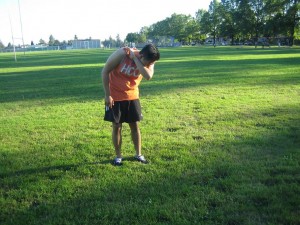Sinusitis is an inflammation or swelling of the tissues that lines the sinuses. Usually, the sinuses are filled with air, but when it becomes blocked and there is fluid and the presence of bacteria, fungi and viruses will cause an infection.
Conditions that causes blockage of the sinuses include allergic rhinitis which involves the swelling of the nasal lining, common cold, nasal polyps which are small growths found in the lining within the nose and a deviated septum which is an alteration within the nasal cavity.
There are different types of sinusitis that you should be familiar with. Acute sinusitis is a sudden onset of cold symptoms such as stuffy nose, facial pain and runny nose that does not heal after 10-14 days but usually lasts from 4 to 8 weeks. Sub-acute sinusitis is inflammation that last for 4-8 weeks. Chronic sinusitis is a condition with inflammation of the sinuses that can last for 8 weeks or more. Recurrent sinusitis happens several times within a year. Always bear in mind that sinusitis can be caused by bacteria, viruses and other factors.

Symptoms of a sinus infection
- Nasal discharge that can be clear, yellow, green or can be tinged with blood
- There nasal congestion, stuffiness and blockage
- Facial pain pressure or fullness can be felt below, above and behind the eyes.
Causes of sinus infections
- Changes in the temperature of air or pressure of air from swimming, flying or diving
- Immune deficiency such as cystic fibrosis and HIV
- Smoking cigarette and secondhand smoke
- Bacteria
- Fungus
- Overuse of nasal decongestants
Treatment and home remedies for sinus infections
- Drink plenty of liquids in order to help thin out the mucus.
- Apply moist heat to the sinus area by placing warm and moist towels or gel packs against the face for 5-10 minutes at least for several times every day.
- Take a hot shower and inhale the steam since this helps in loosening up the mucus and open the nasal and sinus passages. This can also help in relieving pressure. Another alternative is fill a bowl with hot water and then place a towel over the head of the individual to trap the steam and instruct him/her to inhale it in.
- Install a humidifier in order to keep the dry air inside the room more humid but not too humid since moist air is the best place for bacteria and fungi to grow.
- Avoid using alcohol, smoke and dry air since these can cause drying out of the sinuses and nasal passages and cause severe mucus membrane irritation.
- Take prescribed over-the-counter pain medications in order to lessen the headaches, pain and fever as well as corticosteroids that can be inhaled into the nose using a pump or a spray.
- Clean the nasal cavity using a saline solution or salt water in order to keep the nasal passages moist, eliminates thick secretions, eliminates infectious debris and allergens as well as helping minimize the swelling in the nasal passages. Use a neti pot to rinse the nasal passages at least 2-4 times every day, and make sure the neti pot is thoroughly cleaned by scrubbing it with soap and water before using.
- Prepare salt water solution that can be used at home. Mix 3 teaspoons of iodine-free pickling or canning salt with a teaspoon of baking soda, then store the mixture for ongoing use. Every time when there is a need to rinse the sinuses, add a teaspoon of the mixture to a cup or 8 oz. of lukewarm distilled, boiled and filtered water. For affected children, use ½ teaspoon in 4 oz of water.
